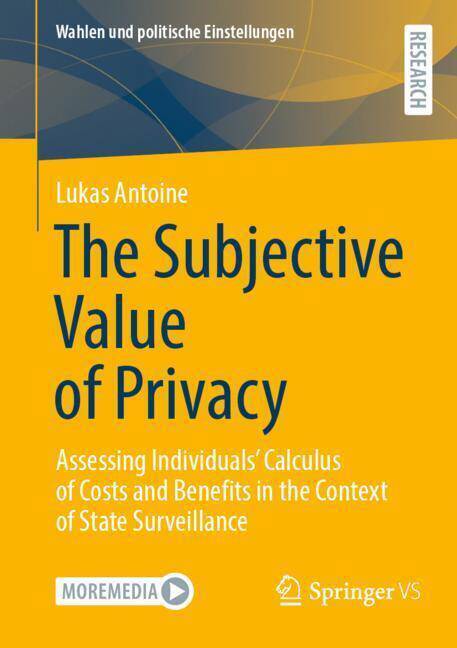
- Afhalen na 1 uur in een winkel met voorraad
- Gratis thuislevering in België vanaf € 30
- Ruim aanbod met 7 miljoen producten
- Afhalen na 1 uur in een winkel met voorraad
- Gratis thuislevering in België vanaf € 30
- Ruim aanbod met 7 miljoen producten
The Subjective Value of Privacy
Assessing Individuals' Calculus of Costs and Benefits in the Context of State Surveillance
Lukas AntoineOmschrijving
This book critically examines the subjective value of privacy in the context of state surveillance, exploring how individuals assess costs and benefits of surveillance. It delves into the complex relationship between attitudes towards privacy, security, and state surveillance and challenges the conventional privacy versus security trade-off through three empirical studies. The first study finds that security justifications for surveillance indeed influence public support for surveillance, particularly in liberal democracies. The second study reveals how financial costs and personal convenience influence support for surveillance. The third study suggests that privacy attitudes may be a stable personality trait, influencing decisions across various contexts. By employing cross-comparative analysis and experimental designs, this book enhances our understanding of privacy's subjective value, refines theoretical frameworks, and offers insights into individual decision-making about privacy. By highlighting the dynamic nature of privacy preferences, this work reveals limitations of simplistic theoretical models and sets the stage for future research in the privacy-security nexus.
Specificaties
Betrokkenen
- Auteur(s):
- Uitgeverij:
Inhoud
- Aantal bladzijden:
- 241
- Taal:
- Engels
- Reeks:
Eigenschappen
- Productcode (EAN):
- 9783658464615
- Verschijningsdatum:
- 25/10/2024
- Uitvoering:
- Paperback
- Formaat:
- Trade paperback (VS)
- Afmetingen:
- 148 mm x 210 mm
- Gewicht:
- 344 g

Alleen bij Standaard Boekhandel
Beoordelingen
We publiceren alleen reviews die voldoen aan de voorwaarden voor reviews. Bekijk onze voorwaarden voor reviews.











